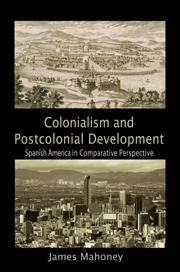Book contents
- Frontmatter
- Contents
- List of Tables, Figures, and Maps
- Preface
- 1 Explaining Levels of Colonialism and Postcolonial Development
- 2 Spain and Its Colonial Empire in the Americas
- 3 Mercantilist Colonialism
- 4 Liberal Colonialism
- 5 Warfare and Postcolonial Development
- 6 Postcolonial Levels of Development
- 7 British and Portuguese Colonialism
- 8 Conclusion
- Notes
- Glossary
- Select Bibliography of Works on Colonial Spanish America
- Index
- Titles in the Series
6 - Postcolonial Levels of Development
Published online by Cambridge University Press: 05 June 2012
- Frontmatter
- Contents
- List of Tables, Figures, and Maps
- Preface
- 1 Explaining Levels of Colonialism and Postcolonial Development
- 2 Spain and Its Colonial Empire in the Americas
- 3 Mercantilist Colonialism
- 4 Liberal Colonialism
- 5 Warfare and Postcolonial Development
- 6 Postcolonial Levels of Development
- 7 British and Portuguese Colonialism
- 8 Conclusion
- Notes
- Glossary
- Select Bibliography of Works on Colonial Spanish America
- Index
- Titles in the Series
Summary
Some set of causes once determined a social pattern…Then ever since, what existed in one year produced the same thing the next year. We will call such theories “historicist explanations.”
– Arthur L. StinchcombeLatin America has not escaped its heritage of colonialism.
– Stanley J. Stein and Barbara H. SteinColonialism not only helped to create the countries of Spanish America; it also sorted them into different positions in the world hierarchy of development. And once these positions were occupied, most countries did not achieve significant improvements or suffer major setbacks in their relative standing. Instead, they tended to maintain their relative levels of development vis-à-vis one another.
Persistence is an old theme in work on Latin America. “More than in any other region,” writes Jeremy Adelman, “the formulation of the past as persistence has shaped regional and national narratives of Latin American societies.” This quotation comes from a substantial anthology entitled Colonial Legacies: The Problem of Persistence in Latin American History. In it, contributors assess the extent to which social formations created during the colonial period have persisted (or not) into the present. My concern here, however, is different. My argument is not that colonial institutions themselves persisted into the present; rather, most of the colonial institutions analyzed here – and their affiliated actors – were gradually rearranged or even abolished in the first decades that followed independence from Spain. It was the positions of the countries in the world hierarchy of development that persisted over the long run.
- Type
- Chapter
- Information
- Colonialism and Postcolonial DevelopmentSpanish America in Comparative Perspective, pp. 203 - 228Publisher: Cambridge University PressPrint publication year: 2010



